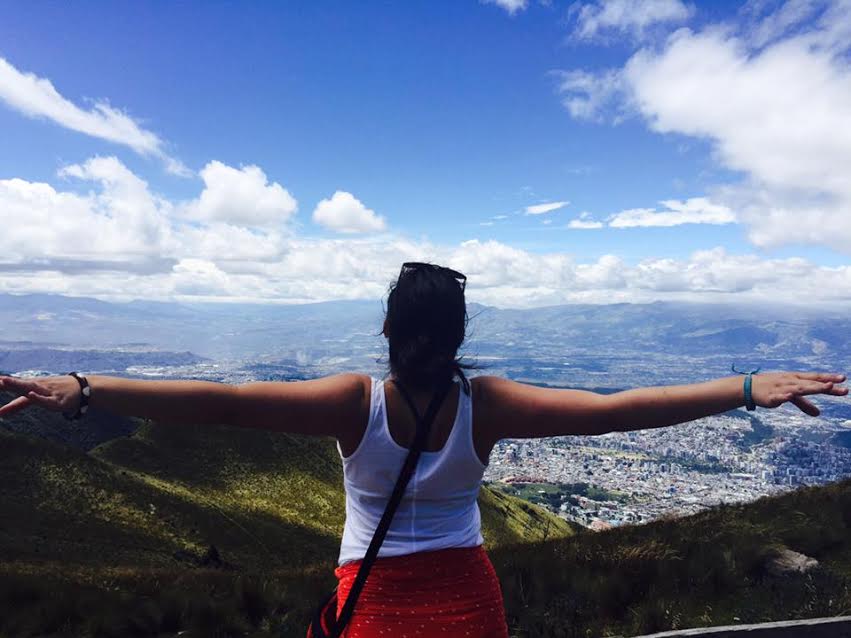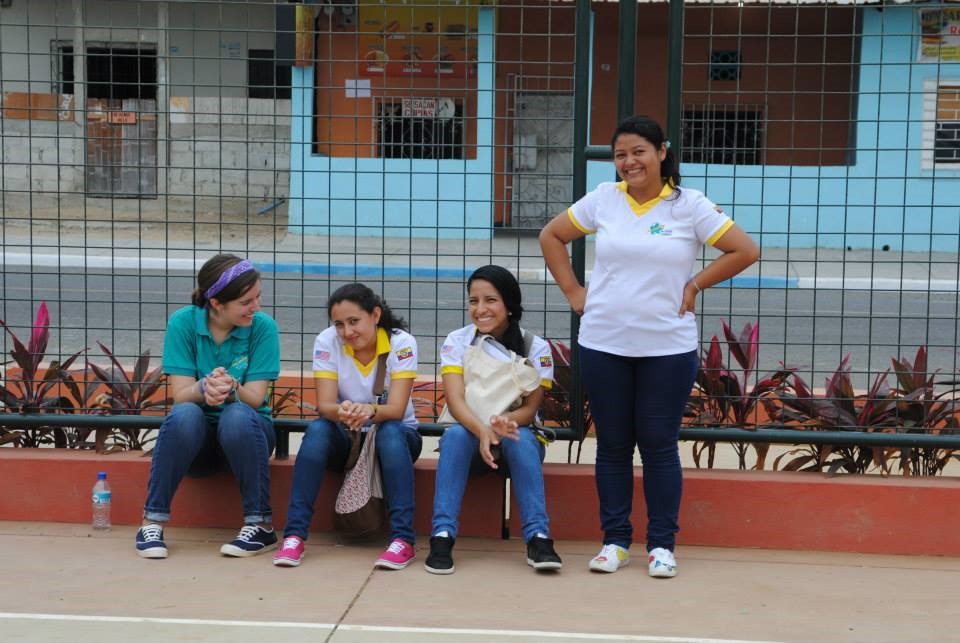Today’s blog is written by Anna Evich,who volunteered with us in Ecuador over the summer in our July group and then returned to help us develop new curriculum and train staff from September to December.
 Before leaving for Ecuador to be a summer volunteer at The Starfish Foundation this past July, I was struggling. I was suffering greatly because of the demands of my job as a teacher, and the excess pressure I put on myself to do everything I could for my students. It was too much and I was starting to break down. One late night in February, I was scrolling through Instagram, trying to avoid the work I had to do for school, when I came upon a post that was advertising the opportunity to work as a summer volunteer in Guayaquil, Ecuador. As soon as I saw it, I knew. I put my phone down, went to the website on my computer, and started working on the application.
Before leaving for Ecuador to be a summer volunteer at The Starfish Foundation this past July, I was struggling. I was suffering greatly because of the demands of my job as a teacher, and the excess pressure I put on myself to do everything I could for my students. It was too much and I was starting to break down. One late night in February, I was scrolling through Instagram, trying to avoid the work I had to do for school, when I came upon a post that was advertising the opportunity to work as a summer volunteer in Guayaquil, Ecuador. As soon as I saw it, I knew. I put my phone down, went to the website on my computer, and started working on the application.
I had never been so sure of anything in my life.
I had traveled to Ecuador while I was in college, and I never forgot the feeling it gave me; how truly happy I felt when I was there. I continued to pray for the people that I met there each week at church, and the desire to return always lingered in the back of my mind. The country and the people and the love that they shared with me and with one another was the most beautiful thing I had ever experienced. I felt like my most authentic self there, and I wanted and needed to be back in that place.

When I arrived in July, everything fell into place. I could think more clearly, and was able to be present in each moment of everything that I did. I absorbed every sensation, every detail, and simply took it all in. I was tutoring students with their English homework, teaching English classes with another volunteer, and creating and presenting professional developments to the staff. Everything was perfect. Only I soon realized that a month in and out was not enough for me. That time made me realize how much more I could contribute to the growth and development of such an incredible organization. The gaps and dents that existed in the school system in Guayaquil were so apparent to me, and I knew I had the skills that were needed to adjust the curriculum. How could I just let that go?
So, I made the decision. I was going back for more. I vividly remember the night before I left. I was washing my hands in the bathroom, and I noticed some black dust of some sort on my chest. I leaned in closer to the mirror, about to wipe it off, and my mouth opened in disbelief. The black mark so clearly formed the word “love” on my chest. It was indisputable. I knew it was a sign. I don’t often look for signs, but when they appear so bluntly, I can’t help but think there is a reason. And there it was. I soon found that my heart was so full in Ecuador, and I know now that it always will be. It’s as if God knew that I was in great need of the love that would be given to me there.
 Upon my arrival, my host family immediately took me in as one of their own. I woke up the next morning in a home that felt warm, comfortable, and familiar, despite having just arrived. There’s just something about this culture that simply cannot be put into words. The kids and educators at the Foundation welcomed me back with open arms, and were genuinely happy to see me. I immediately felt the love. The more time I spent watching the educators with the kids, the more I could feel this crazy rush of ideas pouring out of me.
Upon my arrival, my host family immediately took me in as one of their own. I woke up the next morning in a home that felt warm, comfortable, and familiar, despite having just arrived. There’s just something about this culture that simply cannot be put into words. The kids and educators at the Foundation welcomed me back with open arms, and were genuinely happy to see me. I immediately felt the love. The more time I spent watching the educators with the kids, the more I could feel this crazy rush of ideas pouring out of me.
This time around, I was taking on a new role as Curriculum Development Coordinator, and amazingly, the director and educators were open to every idea (no matter how outlandish) that I proposed to them. I felt empowered, because for the first time ever in my career as an educator, I was granted the creative liberty to make the changes that I saw necessary for my students, without limitations.
I was able to contribute my talents, and actually see the results as they unfolded. I felt appreciated and valued every step of the way. My work was meaningful. I woke up every day excited to get to the Foundation, so that I could continue working on the projects I had started. Work didn’t feel like work. I was giddy to spend time with the educators and students. Somehow even with the barriers of language and culture, we had all kinds of inside jokes and jabs that we liked to throw out at each other for laughs. We could run around making sure all kinds of tasks were getting accomplished, while also keeping the environment light-hearted and enjoyable. I knew that I was truly happy, and I cherished every minute of it.
Finally, the dreaded departure date arrived. I didn’t want to leave. I knew that when I returned to the United States, almost everyone I talked to would say the same things: How incredible the work was that I did in Ecuador. How selfless of me to go and teach those students and teachers so many things, and to leave such an impact. But what most of those people don’t realize is how much I gained in return from my experience. They were not able to witness the beauty of the people that I got to know so intimately.

I think it is safe to say that there was a mutual exchange of knowledge and impact, just in very different ways. My way taught the people I encountered in Flor de Bastión how to better prepare themselves to reach the opportunities that exist in this world, and their way taught me how to achieve life beyond mortality, and seek God in ways I never knew how. So the question is, who really benefited more here? I am forever changed and forever grateful.
A las personas de La Fundación de Estrellitas del Mar: Ustedes estarán en mi corazón por siempre. (To the People of the Starfish Foundation: You are always in my heart.)
 Can you tell us a bit about yourself?
Can you tell us a bit about yourself?




 “It’s important to give kids more ways to shine than just the classroom or the soccer field” – Danny, volunteer
“It’s important to give kids more ways to shine than just the classroom or the soccer field” – Danny, volunteer
 Before leaving for Ecuador to be a summer volunteer at The Starfish Foundation this past July, I was struggling. I was suffering greatly because of the demands of my job as a teacher, and the excess pressure I put on myself to do everything I could for my students. It was too much and I was starting to break down. One late night in February, I was scrolling through Instagram, trying to avoid the work I had to do for school, when I came upon a post that was advertising the opportunity to work as a summer volunteer in Guayaquil, Ecuador. As soon as I saw it, I knew. I put my phone down, went to the website on my computer, and started working on the application.
Before leaving for Ecuador to be a summer volunteer at The Starfish Foundation this past July, I was struggling. I was suffering greatly because of the demands of my job as a teacher, and the excess pressure I put on myself to do everything I could for my students. It was too much and I was starting to break down. One late night in February, I was scrolling through Instagram, trying to avoid the work I had to do for school, when I came upon a post that was advertising the opportunity to work as a summer volunteer in Guayaquil, Ecuador. As soon as I saw it, I knew. I put my phone down, went to the website on my computer, and started working on the application.
 Upon my arrival, my host family immediately took me in as one of their own. I woke up the next morning in a home that felt warm, comfortable, and familiar, despite having just arrived. There’s just something about this culture that simply cannot be put into words. The kids and educators at the Foundation welcomed me back with open arms, and were genuinely happy to see me. I immediately felt the love. The more time I spent watching the educators with the kids, the more I could feel this crazy rush of ideas pouring out of me.
Upon my arrival, my host family immediately took me in as one of their own. I woke up the next morning in a home that felt warm, comfortable, and familiar, despite having just arrived. There’s just something about this culture that simply cannot be put into words. The kids and educators at the Foundation welcomed me back with open arms, and were genuinely happy to see me. I immediately felt the love. The more time I spent watching the educators with the kids, the more I could feel this crazy rush of ideas pouring out of me.

